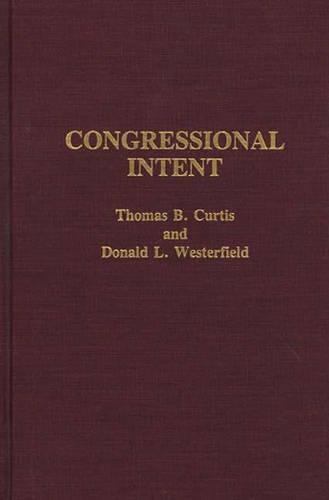
Congressional Intent
(Hardback)
Publishing Details
Congressional Intent
By (Author) Thomas B. Curtis
By (author) Donald L. Westerfield
Bloomsbury Publishing PLC
Praeger Publishers Inc
21st August 1992
United States
Classifications
Tertiary Education
Non Fiction
328.73
Physical Properties
Hardback
192
Description
This volume examines the shift in the emphasis of the United States Congress from a deliberative body to a focal point for political pressures. The Executive, other federal departments, special interest groups, and professional lobbyists exert increasing and, what some believe is undue, influence on Congress. The result has been to distract the Congress from its primary responsibilities of representation and law making. Invisible handshakes with special interests and political action committees--as opposed to study and deliberation--have an increasing impact on the drafting of legislation. This work analyzes these and other problems and offers some recommendations for change. It also gives a firsthand account of some of the important debates and issues that have shaped Congressional procedures. This work will be of interest to scholars in U.S. history and government, political science, and contemporary issues. It will also be of interest to legislators at all levels of government.
Reviews
"[This] is a monumental piece of work and will be very valuable from a historical standpoint. It will be particularly useful for scholars who need to understand some of the inner workings of the Congress which are certainly not very clear to those who have not [personally] experienced service [there]."- John J. Rhodes (R-Ariz.) House, 1953-1983 Hunton & Williams
"A useful contribution to the national understanding and dialogue on this important subject."- Donald Rumsfeld (R-Ill.) House, 1963-1969 former Secretary of Defense
"Congressional Intent is a real guidebook for all who would like to examine the way the United States Congress performs its duties. The authors have dealt with the procedures and practices that have been responsible for many of the important Congressional actions. I commend this book because it is the product of scholarly research and on-site experience. Additionally, it is interestingly and eloquently written."- Carl T. Curtis (R-Neb.) House, 1935-1954 and Senate 1955-1979
"Very interesting, well done, and a significant contribution to Congressional history with many sound recommendations that would help return Congress to the role envisioned by the Founding Fathers."-Richard I. Ichord (D-Mo.) House, 1961-1968 American Freedom Coalition
A propitiously timed, thoughtful look at what ails Capitol Hill. Curtis, a member of the House in the 1950s and 1960s, is not distracted by routine scandals. Rather, he diagnoses that the essential problem can be found in the departure from the House Rules, from the committee process, and from a spirit of studious and open deliberation on the problems of the day. With congressional disregard for the procedural precedents set by the First Congress and for the Reform Acts of 1910 and 1946, problems such as "Christmas Tree bills" and logrolling (representatives trading their support as a saleable commodity, without reference to a bill's merits) keep multiplying. Drawing on his experience, Curtis recounts the techniques that achieve such spectacles, such as "in camera" lobbying. It will probably surprise most citizens that the most pernicious lobbies--and felonious ones at that--are the executive-branch departments. ("Constituent service" scandals, e.g., the Keating Five, show the same corruption of the Constitution flowing in the opposite direction.) Curtis has written an independently minded analysis that should be acquired with such popular critiques of Congress as Restoration by George Will.-Booklist
"A propitiously timed, thoughtful look at what ails Capitol Hill. Curtis, a member of the House in the 1950s and 1960s, is not distracted by routine scandals. Rather, he diagnoses that the essential problem can be found in the departure from the House Rules, from the committee process, and from a spirit of studious and open deliberation on the problems of the day. With congressional disregard for the procedural precedents set by the First Congress and for the Reform Acts of 1910 and 1946, problems such as "Christmas Tree bills" and logrolling (representatives trading their support as a saleable commodity, without reference to a bill's merits) keep multiplying. Drawing on his experience, Curtis recounts the techniques that achieve such spectacles, such as "in camera" lobbying. It will probably surprise most citizens that the most pernicious lobbies--and felonious ones at that--are the executive-branch departments. ("Constituent service" scandals, e.g., the Keating Five, show the same corruption of the Constitution flowing in the opposite direction.) Curtis has written an independently minded analysis that should be acquired with such popular critiques of Congress as Restoration by George Will."-Booklist
Author Bio
THOMAS B. CURTIS is an attorney with the firm of Curtis, Oetting, Heinz, Garrett & Soule, P.C. and was a member of the U.S. House of Representatives from 1951 to 1969. In the House, he served on the Ways and Means Committee, the Joint Economic Committee, the Joint Committee on Internal Revenue Taxation, and the Joint Committee on the Organization of Congress. DONALD L. WESTERFIELD is a Professor in the Graduate School of Webster University. He is the author of Mandated Health Care: Issues and Strategies (Praeger, 1991) and more than ninety published articles and technical papers. He is on the editorial board of two scholarly journals, The Journal of Economics and Finance and The Journal of Business and Economic Perspectives.
